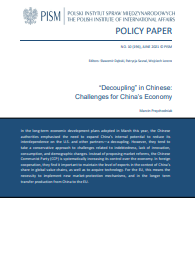№196: “Decoupling” in Chinese: Challenges for China’s Economy
№196: “Decoupling” in Chinese: Challenges for China’s Economy
Author(s): Marcin Przychodniak
Contributor(s): Sławomir Dębski (Editor), Patrycja Sasnal (Editor), Wojciech Lorenz (Editor)
Subject(s): Politics, National Economy, Supranational / Global Economy, Economic policy, International relations/trade, Economic development
Published by: PISM Polski Instytut Spraw Międzynarodowych
Keywords: China; economy; development; strategy; foreign policy;
Summary/Abstract: In the long-term economic development plans adopted in March this year, the Chinese authorities emphasised the need to expand China’s internal potential to reduce its interdependence on the U.S. and other partners - a decoupling. However, they tend to take a conservative approach to challenges related to indebtedness, lack of innovation, consumption, and demographic changes. Instead of proposing market reforms, the Chinese Communist Party (CCP) is systematically increasing its control over the economy. In foreign cooperation, they find it important to maintain the level of exports in the context of China’s share in global value chains, as well as to acquire technology. For the EU, this means the necessity to implement new market-protection mechanisms, and in the longer term transfer production from China to the EU.
Series: PISM Policy Papers
- Page Count: 5
- Publication Year: 2021
- Language: English
- Content File-PDF

